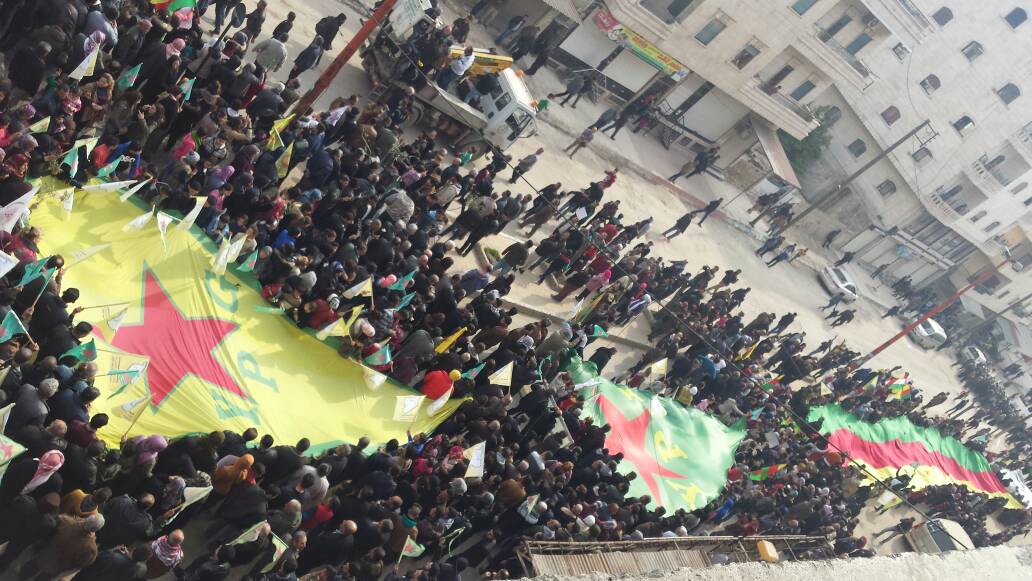Reportage
Turkey bombs their clinics and villages, but Afrin still resists
“If they come, we will resist. My wife also knows how to use a Kalashnikov.” The streets of Afrin are filled with the spirit of resistance against the Turkish invasion.

On Feb. 4, the slogan “Biji Berxwedana Efrîne”—Afrin Resistance, in Kurdish—rang out in the streets of the city of Afrin, in northwestern Syria. Filling up the main avenue of the city, 100,000 people demonstrated against Turkey’s military attack and in support of the resistance by the Syrian Democratic Forces (SDF) led by the YPG/YPJ (People’s Protection Units and Women’s Protection Units).
“The YPG/YPJ and the SDF are us, the people,” a speaker said on the microphone. And the atmosphere prevailing here was one of popular resistance. Almost all the families have relatives and friends who are fighting, and young people who have not joined the military forces are stepping up to give support behind the frontlines. For instance, they are helping the Kurdish Red Cross treat the wounded.
For the past 21 days, this patch of land inhabited by one million people has been resisting against NATO’s second-most-powerful army: all the modern technology of war, from fighter jets to the latest generation of tanks, up against an army of the people, armed with just Kalashnikovs, a few armored vehicles and some heavy machine guns.
Many villages near the front line have been completely destroyed and evacuated, including the towns of Reco and Bilbil, for safety reasons. But in Cindirese, most of the population is determined not to leave, despite the bombings.
The evacuated population is concentrated mainly in the city of Afrin, but they are not running from the area: “I’m not afraid. Where are we supposed to go? This is our land, and here is where we’ll die,” an elderly woman says. Many are saying similar things. A father of three told us: “If they come, we will resist. My wife also knows how to use a Kalashnikov.”
Where there are no bombings, everyday life is going on as usual. The water and electricity supply, available only for several hours a day (since they are produced by diesel generators), are in the hands of the regional institutions, and thus there have been no changes. The landline internet connections, however, were coming from Turkey, and they have been cut off. The mobile network is functional, but it is weak and patchy.
Everyone who is able to do so is hosting displaced people in their homes, and the neighborhood communities are providing logistical support. Every Thursday, thousands of people are taking part in the funerals of dead soldiers and civilians, and they bury their dead while surrounded by the incessant din of ongoing bombing runs. Only their great determination makes it all possible.
The number of civilian victims stands at 150 dead and 354 wounded (data provided by the Health Council of the District of Afrin): “These are not civilians going to the front lines. They are mostly people killed in their homes by the bombings,” says Beritan, a Kurd who is a youth movement activist.
In Reco, Cindirese and Bilbil, the first aid health centers of the Kurdish Red Cross have also been affected. A first aid provider who arrived here from Qamishlo before the attacks told us: “Our center has been hit and destroyed, but our work continues, and we will not stop.” On Jan. 28, in the Robar refugee camp, which is hosting refugees from Tabqa and Raqqa, a bomb killed seven people and wounded 10.
Everyone keeps asking us what people “outside,” in Europe, are saying about this. Trust in governments is rare here: experience has taught them that even those that are not dictatorships have helped in causing the war or in financing Islamist groups.
Moreover, the revolution in northern Syria is, after all, a proposal for the organization of society, which is an alternative to the state model. One finds here a widespread confidence in “humanity,” and the hope that other peoples would do or say something in support of Afrin. The arrival in late January of a YPG unit of international fighters, including Italians, was something everyone was talking about.
On Feb. 6, a caravan of 5,000 people from other regions of the Federation of Northern Syria (Cizire, Ayn al-Arab, Minbij, Tabqa and Raqqa) managed to get to Afrin. The city streets were again filled with people, this time not in protest but in celebration, and a parade of cars and motorcycles with YPG/YPJ and SDF flags. The goal now is to organize another great march in the town of Cindirese, which has been hit by bombings repeatedly, to show that the population has no fear and supports the resistance.
“They have the artillery, the warplanes, the technology, but we have our minds and hearts,” the voice on the microphone said during the march. These words came with a call to remember Avesta Xabûr, a YPJ fighter who on Jan. 27 blew herself up to destroy a Turkish tank.
It’s not two opposing armies that are now at war in the mountains of the region, but rather two opposing visions for the future of this land. For seven years, the revolutionary movement here has built a real alternative for a population that doesn’t want the Assad regime or the Islamists: “Turkey is not a solution for Syria. Turkey is the main problem, both here and in other regions of the Middle East,” says Hamode, a young Arab who supports the resistance.
On one side, we have an authoritarian state with Islamist tendencies. On the other, a revolution that, starting from the struggle of the Kurdish people, has managed to build up a model of peaceful coexistence, not only between Kurds and Arabs, but between all religious and linguistic groups in the area.
Originally published at https://ilmanifesto.it/bombe-su-cliniche-e-villaggi-ma-il-popolo-di-afrin-resiste/ on 2018-02-11
